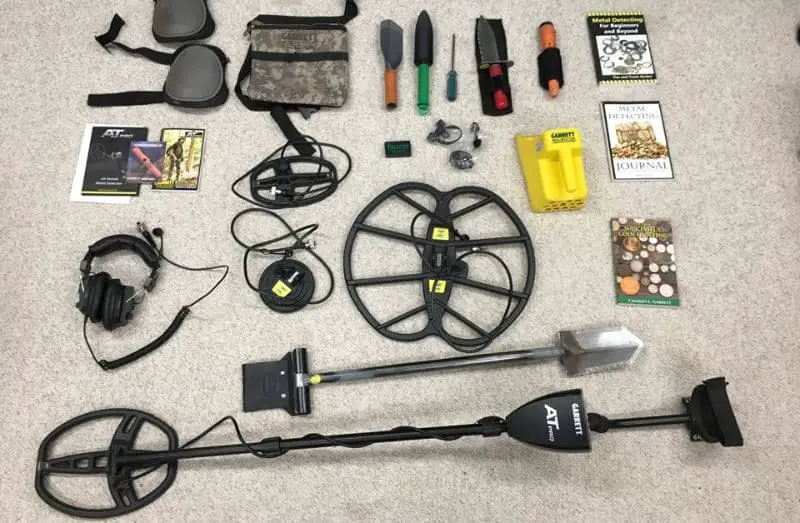
Metal detecting is one of those hobbies where you need to be pretty well equipped.
Obviously a metal detector is your main tool, but you would need others to help enhance your metal detector performance, to protect your machine, to protect yourself as well as to leverage your digging efforts …
In this article, I list about 10 things you need to have while detecting! Keep in mind that not all of them are mandatory, yet they are pretty useful.
1. Search coils
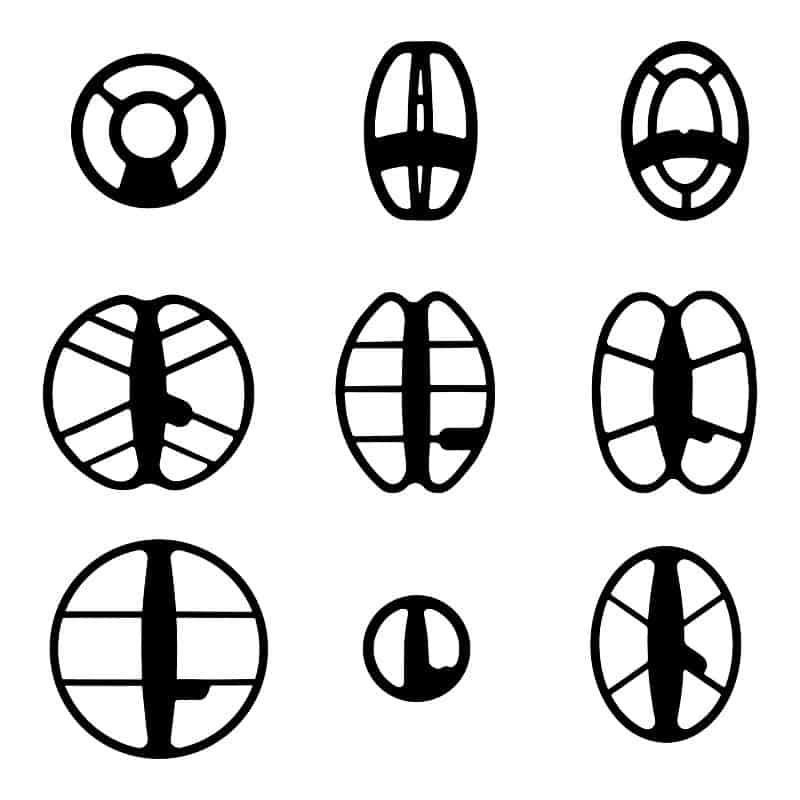
To help your metal detector performance, you may want to add more search soils to your collection.
Of course every metal detector comes with one standard search coil that is built for any average hunt; however, the manufacturers also make many more accessory coils for each detector that is designed for specific applications and conditions.
Accessory coils are available in different shapes, configurations, and sizes to help you get the maximum from your detector.
Metal detector search coil designs are varied and differ as per the size and by shape and configuration. Here are the most notable types …
- Concentric Search Coils: These coils consist of a transmit coil on the outside and a receiver coil on the inside. This coil has the advantage to be wound as large as possible in the search diameter, which provides the best detection depth and also the largest detection field.
- Imaging Coils: This is an advanced version of concentric coils. This is very similar to concentric, but it features another receiver coil, which provides the detector with more significant target information.
- Double D Coils: The Double D design helps cut down on ground interference, recovering performance that gets lost by the concentric coil in mineralized ground.
Keep in mind: Larger coils will allow your detector to go deeper in the ground while smaller ones won’t go as deep, yet they will be more sensitive to smaller targets!
2. Coil Cover
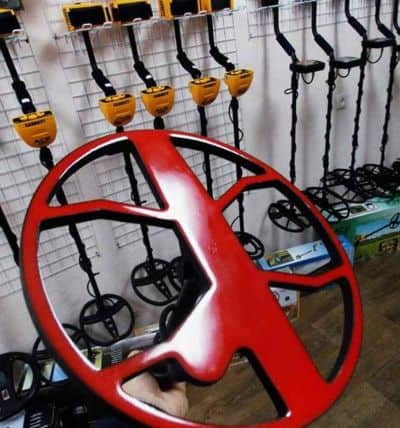
Also known as scuffs (Check this example Here at Amazon), coil covers come for some detector brands such as Tesoro and Minelab, but not for others like Fisher, Garrett, and Tekentics.
Coil covers are used for protecting your search coil from scratches and any dinks. After all, too much wear and tear on a coil will drastically alter its performance, and you will soon be forced to buy another replacement search coil.
That’s why it is highly recommended to have a coil cover early on!
3. Rechargeable Battery
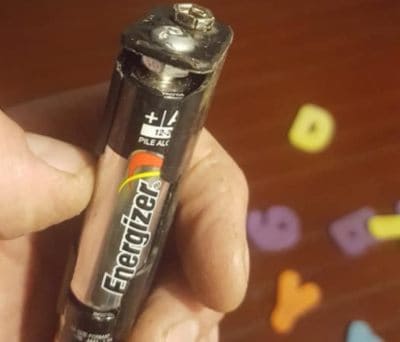
If you use your metal detector frequently and for long periods of time, then you will soon end up spending quite a bit of money on buying batteries. This is why it is advisable to purchase rechargeable batteries for your machine.
The latest generation of rechargeable batteries that are available can keep their charge for several months, and charging them is also very affordable.
If you want to buy rechargeable batteries for your detector, then you need to consider:
- The initial capacity
- How much this capacity will deteriorate after a few charges
- And how long each charge will last when the battery is being used and also while it is stored.
If you are looking for good AA rechargeable batteries, then you can choose from Panasonic, Duracell, Energizer, and many more.
4. Manual Guide: troubleshooting
It is a wise idea to keep the troubleshooting guide that came with your metal detector with you when you are out hunting.
This is because many times, many faults occur with detectors that are, in fact, simple mistakes or misunderstandings on the part of the owner, especially if you are a beginner.
This is why a quick check through the troubleshooting guide or manual will help clear up any doubts or worries you have.
5. Pinpointer
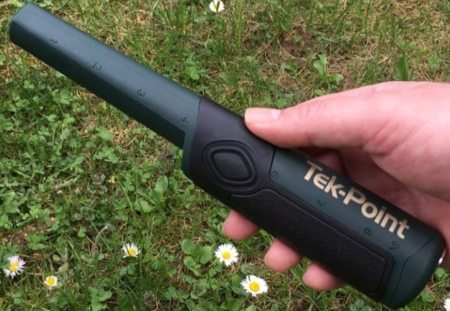
A pinpointer is a small, handheld detector that proves handy in precisely honing in on your target.
While a standard metal detector pinpoints a target area within a couple of inches, having a separate pinpointer will help you accurately locate the object in the hole.
Once you are within a few inches of the target, your pinpointer will start vibrating or beeping.
Pinpointers are a great accessory to have because they allow you to recover your targets ten times faster.
One of the best pinpointers to have is the Garrett Pro Pointer AT (Check it Here at Amazon). But you can buy cheaper models like:
- Makro Pinpointer
- Minelab Pro-Find 25
- Whites Bullseye TRX
6. Shovel
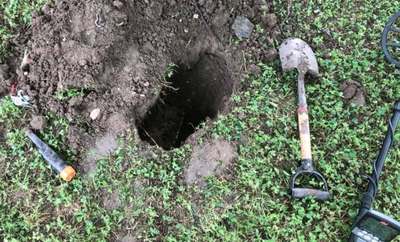
Having a shovel is a must while metal detecting. However, while shovels are available for cheap as well, the fact is that the cheaper the shovel, the faster it is likely to break.
If you are new to metal detecting, then invest in a good quality shovel so you won’t only waste a lot of time digging, but also you will be able to leave the place looking like how you found it initially.
7. Hand Shovel
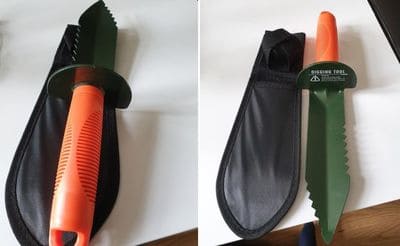
A hand shovel will help you dig, scoop, and move loose materials such as gravel, snow, sand, earth, and even tarmac.
While you may already be having a regular shovel, having a hand shovel is beneficial because they are typically customized for all types of tasks and environments.
For example, some hand shovel is designed explicitly for shoveling snow, digging long and narrow trenches to reach to your target, etc …
Other hand shovels are made with the purpose of multi-tasking. This is why having a variety of shovels will help you determine which one gets the work done best based on particular conditions.
8. Sand Scoop
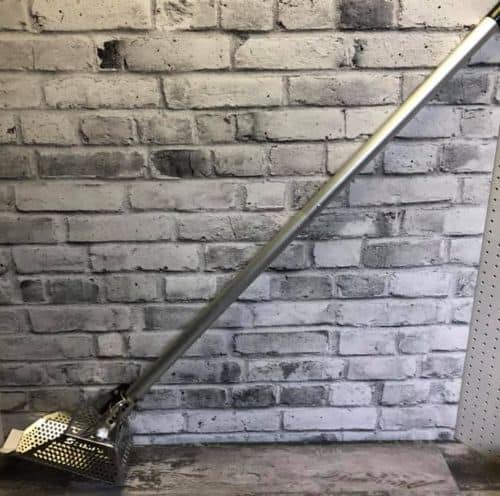
A sand scoop comes in handy while metal detecting at the beach. Do not invest in a plastic sand scoop. It is going likely to break with the first usage itself.
Having a scoop made from stainless steel is the most affordable and sturdy choice. Sand scoops help you recover your targets easily and quickly from sand regardless whether it is wet or dry. Works like a charm in shallow waters too …
They are available in all shapes and sizes. You can choose from short handle scoops, medium handle scoops, and long handle scoops.
If you are hunting on the sandy parts of the beach, then having a medium or short handle scoop will be easy to manage and will also be lightweight.
However, do keep in mind that using a short handle scoop will be tough on your back as you will have to bend down frequently.
All metal detecting sand scoops come with special filters or screens fitted in them to allow you to treasure hunt.
These filters are set to enable small pebbles and sand to flow out while keeping coins, rings, and any other larger items inside and preventing them from slipping out.
9. Headphones
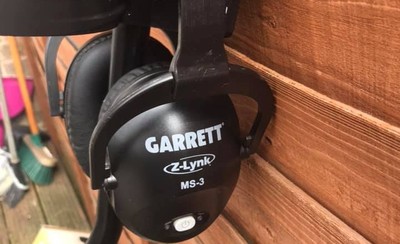
Many mid-level to high-end metal detectors often come with headphones, but most entry-level metal detectors do not come with them.
You don’t always need to have headphones with you, but if you are detecting in noisy environments, then a good quality pair is definitely worth it …
After all, the right way to identify a potential target is by listening to the audio signals, and not by using the visual display available on the LCD screens in some metal detectors.
The visual target indicators can only serve as a supplement to audio and should not specifically be used as the only means of identifying a target.
Furthermore, many metal detectors don’t have a visual target indicator. Traffic noises, wind and wave noises on the beach, kids screaming, and many other environmental disturbances get cut out when you are wearing headphones.
10. Gloves
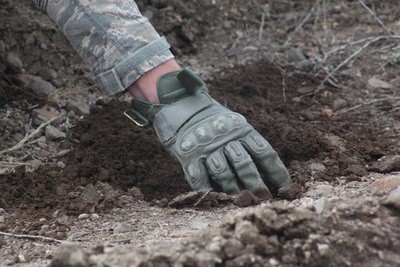
Though they may seem unnecessary, having gloves while you are out detecting can help protect your hands …
However, while buying gloves, make sure to get one that works on your detector screen. Otherwise, you will need to keep removing your gloves each time you find something and need to touch the screen.
A solid buy would be the Mechanix Wear FastFit Work Gloves, which are thin enough to let you work the screen and at the same time will protect your hands and fingers.
Final Thoughts …
Another thing you should always keep with you whenever you are out metal detecting is a first aid kit. While you don’t need to keep it on yourself at all times, but at least keep one in your car or near the location where you will be detecting.
If you are going on a long hunt then remember to have your phone charged to 100% in case you get lost or need help and need to contact someone!
